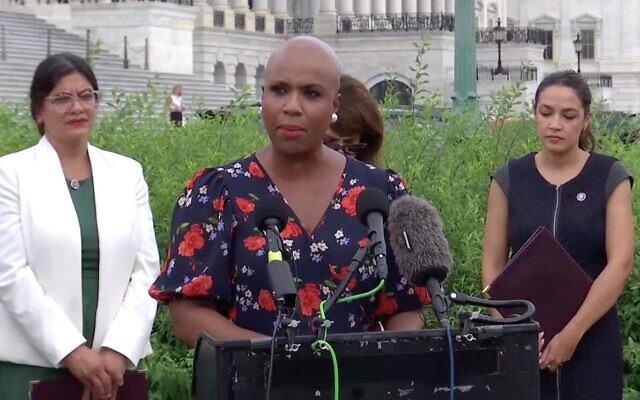The White House did its best to project a sense of normalcy after US President Joe Biden called to congratulate Benjamin Netanyahu for his election victory at the beginning of the month.
“The president reaffirmed the strength of the bilateral partnership and underscored his unwavering support for Israeli security,” according to the White House readout, which added that the US looked forward “to continuing to work with the Israeli government on our shared interests and values.”
“Warm phone call, great talk… unbreakable ties,” tweeted US Ambassador to Israel Tom Nides, employing a writing style mimicking that of former president Donald Trump, who headlined a golden era of relations between the US and Israeli governments.
Biden has sought to sustain those warm ties, but he has had the luxury of working for most of his presidential tenure with the now-outgoing unity government in Israel led by Naftali Bennett and Yair Lapid — two leaders whose interests aligned more closely to his own.
While he may have a storied rapport with Netanyahu, the same cannot be said for the presumed incoming prime minister’s hardline partners, who will undoubtedly seek to pull Israeli policy further to the right and away from the type of two-state resolution with the Palestinians that the Biden administration would like to see.
Get The Times of Israel's Daily Edition by email and never miss our top stories
“The president has been able to work well with prime minister Netanyahu for decades,” said one senior US official speaking on condition of anonymity. “But there’s no doubt that we’re about to enter an era that will be a lot more challenging.”

File: US Ambassador to Israel Tom Nides (L) and opposition chairman Benjamin Netanyahu meet in the Knesset on December 9, 2021. (US embassy in Israel)
Out of Biden’s control
That era has begun even before Netanyahu has taken office, with the FBI decision earlier this month to open an investigation into the killing of Palestinian-American journalist Shireen Abu Akleh. The move was blasted by Jerusalem, which has acknowledged that one of its soldiers was likely responsible while insisting that the shooting had been an accident and that its own investigation — reviewed by US authorities — had been sufficient.
An independent American investigation had not been sought by Biden, and the White House informed Israel that the Justice Department opened the investigation without its knowledge, according to an official familiar with the matter.
But the development only demonstrates how Biden is not solely responsible for setting US policy on Israel.
“This is not Scoop Jackson’s Democratic Party,” Biden told Netanyahu during a call last year, referring to the strikingly pro-Israel senator whose long tenure ended in the 1980s.
A growing number of Democrats are refusing to accept the Israeli narrative, including on the Abu Akleh affair. The aforementioned well-placed official said that congressional pressure played a role in the FBI’s decision to open its investigation.
And that pressure wasn’t even coming solely from Squad-aligned Congress members. Among those who spoke out in favor of an independent probe into the journalist’s killing were moderate Democrats Cory Booker and Robert Menendez.

Rep. Ayana Pressley speaks during a press conference on Capitol Hill, calling for the US to open an independent investigation into the killing of Palestinian-American journalist Shireen Abu Akleh, on July 28, 2022. (Screen capture/Facebook)
Menendez and another longtime pro-Israel stalwart, Rep. Brad Sherman, also took the unusual step of weighing in ahead of the recent Israeli election, warning of the damage Otzma Yehudit leader Itamar Ben Gvir posed to bilateral relations.
The State Department has also not waited for Ben Gvir to be installed as a minister to begin speaking out, blasting him for attending an “abhorrent” ceremony memorializing extremist rabbi Meir Kahane.
It is true that on the issue that Netanyahu has a proven willingness to buck a sitting Democratic president — Iran — no major dispute appears to be in the offing. Negotiations to revive the multilateral deal, which traded sanctions relief for curbs on the Islamic Republic’s nuclear program, have failed to achieve results. The Biden administration has been announcing a new round of sanctions against Iranian officials and companies almost every week in statements reminiscent of those issued during the Trump administration, which pulled out of the nuclear deal in the first place.
Jerusalem trumps West Bank
For the US though, the more pressing issue as far as Israel is concerned is maintaining calm in Jerusalem, according to Israel Policy Forum’s Michael Koplow, who argued that Ben Gvir poses an obstacle to that effort.
Koplow pointed to the makeshift office set up by the Otzma Yehudit chairman in the East Jerusalem neighborhood of Sheikh Jarrah to support the nationalist Jewish groups seeking to evict Palestinian families from the area — a move that the Biden administration opposes.
The far-right lawmaker slated to become national security minister has more recently ceased talk of permitting Jewish prayer on the Temple Mount, but said Sunday that he plans to visit the flashpoint site in the coming weeks in a move likely to stoke conflict.

MK Itamar Ben Gvir seen with head of the racist Lehava organization Bentzi Gopstein in a protest tent amid high tensions in the East Jerusalem neighborhood of Sheikh Jarrah on May 6, 2021. (Olivier Fitoussi/Flash90)
While there will naturally be differences of opinion with regard to Israeli settlements in the West Bank, Koplow argued that the Biden administration is more likely to butt heads with Israel on the issue of Jerusalem, given the holy city’s proven ability to serve as tinderbox capable of igniting broader conflict.
“The administration’s stance [against] trying to get an Israeli-Palestinian peace deal isn’t going to change. Of course, settlements are always a concern, but I think that the priority over the past two years for the White House has been to just keep things quiet and to not have to deal with big flare-ups of violence,” Koplow said. “If that’s if that’s what you want to avoid, then Jerusalem is absolutely going to be the top of the list of concerns.”
Boycotting Ben Gvir
The Biden administration made a habit of engaging with outgoing Public Security Minister Omer Barlev in order to push for calm in Jerusalem, but a US official said it was unlikely that the Biden administration would engage with his successor, Ben Gvir, or Religious Zionism chairman Bezalel Smotrich, who is rumored to become the next finance minister.
Koplow speculated that the boycott would likely extend to other Otzma Yehudit ministers, while noting that Republican lawmakers are not likely to uphold the same policy. “There’s going to be potential for awkward situations if House Republicans invite Ben Gvir to the United States, and the administration refuses to meet him while he’s here.”
“The guy has a conviction for supporting a terrorist organization. It doesn’t seem like it’d be completely out of bounds for [the Biden administration] to deny him a visa. Certainly, it would be on better grounds than the Israelis not allowing Rashida Tlaib and Ilhan Omar to enter Israel,” he added, referring to the 2019 Netanyahu decision against the Squad lawmakers over their support for boycotting the Jewish state.
And although Jerusalem might supersede the West Bank on the list of issues over which the US will be willing to push back against Israel, that doesn’t mean Netanyahu will have a green light from Biden to expand Jewish presence beyond the Green Line.

Jews visit the Temple Mount on Rosh Hashanah eve, Sept. 25, 2022. (AP Photo/ Maya Alleruzzo)
Days after Netanyahu’s election win, Nides warned that the US will fight “any attempt” to annex West Bank territory.
The incoming Israeli premier committed to holding off on the controversial move until at least 2024, and he is unlikely to want to risk jeopardizing the Abraham Accords normalization agreements he’s already signed as well as the chances for new deals with other countries.
However, Netanyahu is said to have agreed in coalition talks to transfer the military body that governs aspects of civilian life in some 60 percent of the West Bank to the Finance Ministry in a move that critics are decrying as “de facto annexation.”
He’s also reportedly agreed to advance the regulation of the 100-plus illegal outposts that pepper the West Bank in another move the US will seek to block.
The return of sidelining Abbas
Koplow maintained that despite the hardline nature of Israel’s next government, it still might be willing to heed certain requests from the US to improve Palestinian livelihood in the West Bank. Already approved projects to grant Palestinians 4G cellular access and expand the operating hours of the Allenby Crossing between the West Bank and Jordan won’t necessarily be shelved.

Far-right MKs Itamar Ben Gvir (L) and Bezalel Smotrich at the Damascus Gate outside Jerusalem’s Old City on October 20, 2021. (Yonatan Sindel/Flash90)
“Smotrich and Ben Gvir wouldn’t necessarily be opposed to economic measures… so long as it’s made very clear that Palestinians will not be getting any measures of sovereignty, or perhaps even autonomy,” Koplow said. “The days of [PA President] Mahmoud Abbas going to the defense minister’s house are over,” Koplow said.
Given the critical role the US plays in regional cooperation, Netanyahu will need the Biden administration in order to expand what he views to be a critical part of his legacy — the Abraham Accords.
Accordingly, the Israeli premier — like Biden — will want to keep public disputes at a minimum. But this won’t be possible if Netanyahu ends up being more beholden to his coalition partners than they are to him.


